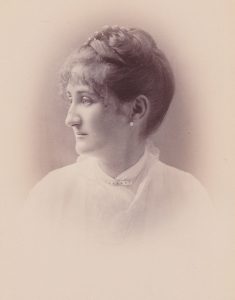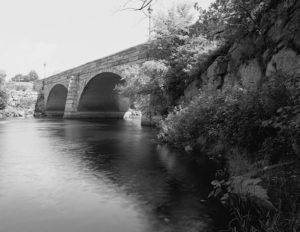Edna Dean Proctor (1829 – 1922) was born in Henniker, New Hampshire on September 18, 1829 to Captain John Proctor and his third wife Lucinda (Gould) Proctor. After her father died in 1837, her mother married Joseph Calef Thompson, a farmer, and the family moved to Andover, New Hampshire. Edna’s education began at home in Henniker with her mother as her teacher. In her teens, she attended Mount Holyoke Seminary (Class of 1845), but had to drop out due to illness. Later, she continued her education in Concord, New Hampshire. At an early age, she showed great promise as a writer and poet. While in her teens, some of her poems were published in the local newspaper.

In 1848, Miss Proctor began teaching art and music in Woodstock, Connecticut. Between 1850 and 1854, she taught at Mary Dutton’s school in New Haven, Connecticut. It was here that she met Henry Bowen, a successful newspaper publisher and printer, who hired her as a tutor for his eleven children. She moved to Brooklyn, New York to live with the Bowen family which brought her in contact with people in New York City’s highest social and intellectual circles. Among her friends, she counted John Greenleaf Whittier, Henry Wadsworth Longfellow, and other poets of the day. Many of her poems were published in Henry Bowen’s newspapers, The Brooklyn Union and The Independent.
While in Brooklyn, she attended Sunday services at the Plymouth Congregational Church where Henry Ward Beecher preached. He was a very inspirational speaker who was known for preaching about God’s love and his support of the abolition movement. Edna wrote down his sermons for the years 1856 through 1858 and published them in a book entitled Life Thoughts, Gathered from the Extemporaneous Discourses of Henry Ward Beecher.
Edna Dean Proctor was a world traveler. On a trip to Kentucky to visit an uncle in 1850, she spent some time in Cincinnati, Ohio where she met Harriet Beecher Stowe (author of Uncle Tom’s Cabin and sister of Henry Ward Beecher) and got involved in the anti-slavery movement. During the Civil War, Miss Proctor wrote many poems in support of abolition and the Union cause. In 1866, she traveled to Europe, the Middle East, and the Holy Land with Mr. and Mrs. Charles Storrs and their daughter Sarah of Brooklyn, New York. Her diaries from this trip were the inspiration for her book A Russian Journey which describes peasant life in Russia. Upon her return from this trip, she went to live with the Storrs family in Brooklyn.
Edna stayed with the Storrs’ family in Brooklyn until 1885, the year Charles Storrs died. At this time, she left Brooklyn and moved to Framingham, Massachusetts to live with her mother and sister. While in Framingham, she lived at several locations including Union Avenue and Proctor Street. Edna became part of the literary community around Boston and belonged to the Boston Author’s Club.
Edna Dean Proctor’s career as a poet was at its peak from the 1860’s to the early 1870s. Later in life, she wrote poems for special occasions including “Columbia’s Banner” (1893) for the Columbus Day programs across the United States and “Framingham” (1900) for the town’s bicentennial celebration. She also published seven books of poetry throughout her lifetime- Poems in 1866 (national poems written during the Civil War); Poems in 1890; The Song of the Ancient People in 1892 (poems about a group of Pueblo Indians, the Zunis of New Mexico); A Russian Journey in 1899 (life in Russia); The Mountain Maid and other Poems of New Hampshire in 1900; Songs of America and other Poems in 1905; and The Glory of Toil and other Poems in 1916.
Edna never married. She died on December 18, 1922 at the age of 94 at the Kendall Hotel in Framingham. She is buried next to her mother in the Edgell Grove Cemetery. The Framingham History Center has one of Edna’s dresses as well as an original copy of A Russian Journey on display as part of the History in the Stitches Exhibit.

Further Reading
“Online Books by Edna Dean Proctor.” The Online Books Page. http://onlinebooks.library.upenn.edu/webbin/book/lookupname?key=ProctorEdnaDean1829-1923 Accessed 14 March 2017.
Bibliography
Brown, Janice. “Henniker New Hampshire Poet: Edna Dean Proctor (1827-1923)” Cow Hampshire’s History Blog. Posted 7 August 2007. http://www.cowhampshireblog.com/2007/08/07/henniker-new-hampshire-poet-edna-dean proctor-1827-1923/ Accessed 1 March 2017.
Cost, Charles C. Edna Dean Proctor, Poetess of the Contoocook. Henniker Historical Society, 2008.
“Edna Dean Proctor.” House of Proctor Genealogy. http://www.houseofproctor.org/genealogy/showmedia.php?mediaID=8639 Accessed 14 March 2017.
Lamb’s Biographical dictionary of the United States, edited by John Howard Brown. Vol. 6. Federal Book Co., 1903. P. 361. Accessed 14 March 2017.
Perkins, George B., et al. “Proctor, Edna Dean (1829-1923).” Benet’s Reader’s Encyclopedia of American Literature, vol. 1, HarperCollins, 1991, p. 882. Literature Resource Center, libraries.state.ma.us/login?gwurl=http://go.galegroup.com/ps/i.do p=GLS&sw=w&u=fpl &v=2.1&id=GALEA16854557&it=r&asid=991d1f91fbe27e2519cc3a2646755beb Accessed 1 Mar. 2017.